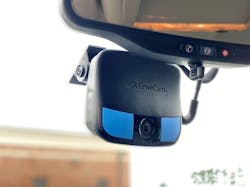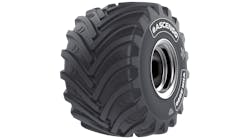With an eye on safety, commercial tire dealerships are installing dash cams - some of which use artificial intelligence and telematics-infused technology - to monitor drivers of their vehicles.
The motive isn’t to invade workers’ privacy or activate a “Big Brother” mentality.
Instead, dealers say it’s a way to correct and coach employees on safer driving habits and hopefully prevent accidents.
Colony Tire Corp., which is based in Edenton, N.C., has installed cameras in nearly every vehicle in its entire fleet, which numbers around 500 units and includes tractor-trailer trucks, service trucks and box trucks, as well as pickup trucks. Those vehicles are tied to the company’s retail and commercial locations spread across North Carolina, South Carolina and Virginia.
Adam Britt, director of risk management for Colony Tire, joined the tire dealership in January. He says one of the reasons he came to the company was because Colony’s leadership “has a forward-thinking, proactive safety mindset. When they see an opportunity to improve from a safety standpoint, they’ll do their due diligence, but once they can see the value of it, they jump in with both feet.”
Dash cams have become a piece of Colony Tire’s overall safety program. One factor that helped the company commit to dash cams is the sense that they could provide evidence and protection if an event led to a legal fight.
Britt says when ownership “heard what the litigious landscape was looking like and how dash cams can benefit the company, they didn’t hesitate.”
Colony Tire activated its first camera in February 2019.
Even in the last three years, camera technology and capabilities have evolved. Colony Tire opted to hire Lytx, a company that specializes in telematics services, including cameras, for fleets.
There are front- and rear-facing cameras installed in Colony Tire’s vehicles and Britt says the cameras are triggered to activate and record by certain actions sensed by the vehicle’s telematics system, such as hard braking, hard cornering or acceleration.
What happens next varies by camera vendor and the notification parameters a customer like Colony Tire establishes.
But every instance of hard braking or following another vehicle closely doesn’t necessarily need Britt’s immediate attention. Sometimes, a vehicle is driving in rush hour traffic.
With Lytx, Britt says the vendor has a human who filters and rates every recorded incident. And if a trigger hits a certain threshold on that scale, it sends an alert to Colony Tire.
Britt reviews those incidents and can also search all of the recorded incidents for certain behaviors. Right now, the company is focused on hand-held cellphone use. Colony Tire’s policy bans the use of all hand-held electronic devices and specifically using those devices for any kind of written communication.
The policy even bans using dictation tools with Bluetooth capabilities to text a message “because we find people go back and edit those, which negates the whole point of the Bluetooth.”
Britt says when he reviews recorded incidents, he sorts the search for anything that indicates the use or presence of a hand-held device to “make sure were attacking those as soon as possible.
“We explain (to the employee) this is a serious situation for you, the driver, for the other vehicles around you and for us as a company. We do not tolerate it, do not accept it and (we) let them know that continued behavior using a hand-held cell phone will result in termination.”
In the last year, Britt says only one incident has escalated to the point ofan employee being threatened with termination as the next step.
The cameras have also allowed for a focus on speeding prevention, as well as driver fatigue, which is especially problematic for service truck drivers who respond to after-hours calls.
Britt says the cameras have also helped clear up mysteries surrounding certain incidents and even have vindicated drivers.
He says there are times he’s wondered, “How did this happen if you weren’t doing something that was against our company policy?”
One recent example came when an employee drove through a red light and collided with another vehicle that had the right of way. Luckily, there were no serious injuries. Britt turned to the camera view for an explanation. The driver wasn’t distracted by a phone, wasn’t smoking and wasn’t nodding off. He simply had a mental lapse. His mind wandered and he drove through the traffic light.
Britt says the video helped the company. “We got the video to our insurance company. They contacted the claimant vehicle as soon as possible, told them we’re accepting liability” and wanted to get their vehicle repaired in a timely fashion.
“That claimant driver didn’t sit at home, seeing those attorney commercials saying ‘How much money can I get you?’ They didn’t become litigious, so that kept the claim cost down.
“On top of that, doing the investigation into this driver, instead of making assumptions about this driver and what he was distracted by, we were able to see what he was distracted by. It was a mental lapse.
“We took that information, compared it to any of his previous employment issues – which this driver had none – and we were able to stick with our standard progressive discipline policy. It did have some punitive action against the employee, but it didn’t result in his termination. He keeps a job with great benefits and good pay. We keep an employee that hasn’t had any issues in the past. Our distribution network doesn’t suffer operational lag.
“Yes, we’re out on the equipment side and of course, our deductible, but that is a very small amount compared to a situation where we didn’t have the information and maybe made a wrong decision about termination.”
In short, Britt says video provides “the full picture” and allows Colony Tire “to make a better decision.”
Meridian, Iowa-based Commercial Tire Co. is a newer user of dash cams. The company started adding cameras to its vehicle fleet earlier this year and completed installation in July.
Casey McGrew, the dealership’s safety manager, is now tweaking the system on the back end.
Even in the short time the company’s cameras have been live, McGrew says the dealership has seen many videos of near-miss incidents “that would have never been reported or brought to our attention.”
But the “alert on the camera allowed for conversations with our techs and our drivers.”
McGrew says those near-misses and incidents caught on tape are providing an opening for training and policy reviews. It’s also an opportunity to remind employees of a basic message related to distracted driving, he says.
“You are in a company rig. You’ve got the company logo on the side of the truck. There’s just such a huge risk and a liability. It’s not worth being distracted in any way, shape or form.”
Cameras aren’t an automatic problem-solver on their own, he admits. However, they go hand-in-hand with company policies and McGrew says they have highlighted the need for accurate, up-to-date enforceable rules.
“It’s eye opening to see that as a company you have these expectations and policies – to be hands-free, zero texting and driving – and then you start seeing what’s happening in the cab of the truck,” says McGrew.
“You see there are opportunities for growth. And you see when we need to be addressing something we know (is) happening. We can take the proactive approach.”
Commercial Tire has actually dialed back its cell phone policy a bit. The company used to outlaw all phone use when driving, but has updated the policy to allow hands-free use. McGrew says employees are still expected to be focused on the road, but the revised policy now allows for the company’s sales teams to keep working while on the road.
“We had to weigh the benefits and risks, so we’ve decided as long as the truck is hands-free, then we’re able to utilize that.”
One concern among tire dealers is how the use of dash cams might affect its drivers, and specifically, if adding cameras will prompt any employees to leave.
With about 300 vehicles and 700 employees, McGrew says, “We did not lose one employee from a camera being installed in a pickup or semi truck. “We were up-front with how it’s managed.”
And as a whole, managers don’t have access to the cameras. The company wants to protect employees’ privacy and didn’t want silly or embarrassing video clips to show up in the shop. The system doesn’t record audio.
“I would say it’s been overall really well received,” says McGrew. Employees have learned that “just because an alert happens, doesn’t mean I’m getting in trouble.”
McGrew has even found that the cameras tamp down his own worries when he hears about an incident. In one memorable situation, “I was able to pull video of (the incident) right away. I was able to see it was not our fault – that a car hydroplaned in a rainstorm and we hit them, but they came into our lane.”
In another instance, the company’s vice president of operations had a truck and trailer jackknife and flip on the road in front of him. He called and asked McGrew to pull the video. They even shared it with police.
McGrew says use of video complements what he calls Commercial Tire’s “evolving safety culture. We’re taking opportunities (and) utilizing technology to ensure that we’re ahead of the game and proactive in our approach toward the safety of our employees, the customer and the public.”





